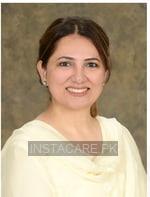Acupuncture - Symptoms, Risk factors and Treatment
Last Updated On Friday, February 13, 2026
Acupuncture in Urdu
ایکیوپنکچر ایک بہت قدیم عمل ہے اور کئی صدیوں سے اس کا مطالعہ کیا جا رہا ہے۔ ایکیوپنکچر کے فوائد ہر شخص سے مختلف ہوتے ہیں۔ کچھ لوگوں کو ایکیوپنکچر کے بعد بہت سکون ملتا ہے، جب کہ کچھ لوگوں کو اس سے فائدہ نہیں ہوتا۔ اگر آپ کے پاس کوئی ایسی حالت ہے جس میں ایکیوپنکچر مانع ہو سکتا ہے، تو بہتر ہے کہ طریقہ کار کروانے سے پہلے اپنے ایکیوپنکچر سے مشورہ کریں۔
Acupuncture in English
Acupuncture is a type of traditional Chinese medicine, an ancient strategy in which very thin needles are inserted into different parts of the body.
How does acupuncture work?
The practice of traditional acupuncture is based on the idea that the human body is filled with a force, a life-giving force called Qi (pronounced, "chee"), which flows through the human body in pathways known as “meridians”. It is believed that if Qi flows in the right direction, a person remains healthy, and if the flow of Qi is disturbed, illness occurs. Acupuncture helps restore the flow of Qi.
Modern-day acupuncture is usually done after a clinical diagnosis and involves stimulating different sensory nerves with needles which results in the release of pain-killing chemicals called endorphins.
What are the Uses of Acupuncture?
Acupuncture is used for a wide variety of conditions such as:
- Tension Headaches
- Migraines
- Neck Pain
- Joint Pain
- Dental Pain
- Postoperative Pain
- Osteoarthritis
- Menstrual Cramps
- Labor Pain
- Anxiety
- Depression
- Sleep Problems Like Insomnia
- Hypertension
- Allergies
How is Acupuncture Done?
Acupuncture may seem scary, but it does not cause much discomfort. During the procedure, the acupuncturist- the person who performs the acupuncture, will choose the acupuncture points where the needles will be inserted. They will let you know where they will insert the needles and if any clothing needs to be removed.
Needle insertion does not cause much pain except slight discomfort. If you feel extreme pain, let your acupuncturist know right away. They may insert the needles to different levels of depth in the skin and muscles.
After inserting the needles, your acupuncturist may move or twirl the needle. After 10 to 20 minutes, your acupuncturist may remove the needles. After the removal of needles, there is little to no discomfort for a short time. However, some people may experience some side effects.
Side effects of acupuncture:
Some people may experience side effects after acupuncture which may go after a short while such as:
- Feeling dizzy
- Fatigue
- Soreness
- Pain on the site where the needles were inserted
- Bleeding from the needle insertion site
- Exacerbation of the pre-existing pain
- Feeling drowsy
Contraindications of Acupuncture:
Acupuncture may be contraindicated in different conditions such as:
Pregnancy: Though acupuncture can be safely done during pregnancy, depending on different sites, acupuncture can stimulate uterine contractions and may cause premature labor to start.
Infection at the acupuncture site: If you already have an infection at the site where needles are to be inserted, acupuncture is usually avoided until the infection is cleared up.
Metal allergy: If you are allergic to metals, the needle can provoke an allergic response, making matters worse.
Bleeding disorders: In bleeding disorders like hemophilia, there is a problem with clotting blood which can result in bleeding from the acupuncture site.
Conclusion
Acupuncture is a very ancient practice and has been studied for many centuries. The benefits of acupuncture vary from person to person. Some people find great relief after acupuncture, while some people may not benefit from it. If you have any conditions in which acupuncture may be contraindicated, it is best to consult your acupuncturist before getting the procedure done.
Frequently Asked Questions
Acupuncture meaning in urdu is Sozan zai سوزن زئی.
Acupuncture is the practice of penetrating the skin with thin, solid, metallic needles which are then activated through gentle and specific movements of the practitioner's hands or with electrical stimulation. It is part of the ancient practice of Traditional Chinese medicine, which believes the human body has more than 2,000 acupuncture points connected by pathways or meridians. Stimulating these pathways is thought to improve the flow of Qi, thereby improving health. Acupuncture can be used to relieve chronic pain, reduce stress, and treat a variety of medical conditions.
An example of acupuncture is the insertion of fine needles into specific points on the body in order to reduce pain, improve circulation, and promote relaxation. Acupuncture is an ancient Chinese practice that is part of Traditional Chinese Medicine (TCM). It is believed that stimulating specific points on the body can help restore the balance of energy, or qi, in the body. Acupuncture is commonly used to treat chronic pain, headaches, stress, and many other health problems.




